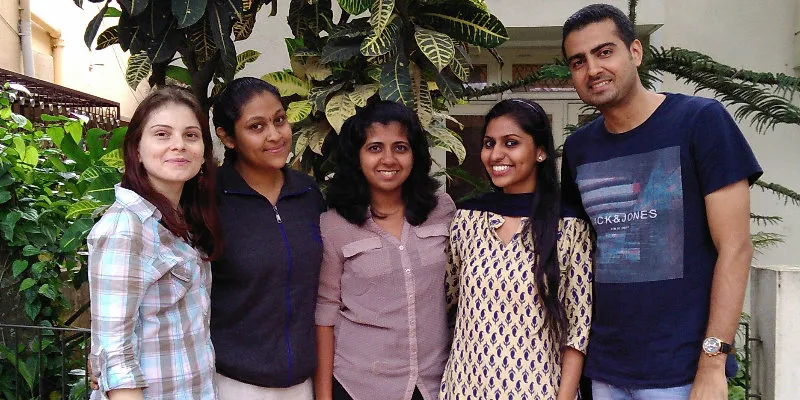Bengaluru-based vChalk Education to support 1 million semi-urban kids by strengthening English and math skills
The story of vChalk Education can be traced back to 2011, when Daniela Gheorghe (30) and Anil Bishnoi (29) met at an education consulting firm in Jaipur. The duo bonded over their disappointment at the fact that children, despite going to school, are not really learning. According to the Annual Status of Education Report, four in 10 kids in developing countries fail to learn the basics even after spending four years in school.

On their journey towards solving this learning crisis, they have interacted with rural artisans in Rajasthan, ragpickers in small towns of Telangana, and rural housewives in Assam. One commonality the pair found in all these people was their desire to send their children to affordable private schools despite the fact that the children were struggling to meet grade-specific skills. Keeping this in mind, in December 2014, Anil developed a video conferencing tool allowing teachers and students to interact with their peers across the country.
However, having realised that the problem lies in teaching patterns and not inter-classroom communication, Daniela and Anil took a step back and were left with two options —to invent a solution, or to research an already proven-at-scale solution and distribute it to a market segment that didn’t have access to it. They chose the latter one.
At that time Daniela was just ending her journey as a Frontier Market Scout in waste management in Telangana, while Anil was ending his collaboration with Sony as a software engineer. They started their search for a proven-at-scale solution to help kids learn to read and calculate.
We came across rigorous research done by researchers from MIT’s J-PAL on an effective method of organising the classroom called ‘teaching at the right level’, where kids are organised by their actual learning level and not by age or grade. This was how we started,” says Anil, who studied engineering at theUniversity of Rajasthan.
Empowering a million students
vChalk Education enables school teachers to deliver and monitor effective catch-up classes in primary-level English and math using interactive activities targeted towards students’ actual learning levels. Bengaluru-based vChalk has four full-time members and two learning advisors.
vChalk Education trains teachers in using teaching at the right level pedagogy and identifying children in grades two to five who can’t read a story and do basic subtraction. It plans to reach 2,000 primary-grade children who lacked basic skills in the academic year 2016–2017.
To enable teachers to plan classes without dependence on Internet connectivity, vChalk brings vChalkbox, a mini-server, into the school.Teachers can connect to the server via Ezy, an offline mobile application that describes the activities for each group of children without internet connection.
Teachers can connect their smartphones to the Wi-Fi and access high-quality content that describes the activities they need to do with each group of children in class that day. The company works with a school for a maximum of eight months, taking one or two classes per day.
How seed money came in…
After winning the D-Prize Award and receiving $15,000 worth of funding for a three-month pilot project, vChalk Education was started as a for-profit social enterprise in September 2015.The money helped the company test children between grades three and five on basic English reading and number operations.
From August last year to date we have tested more than 1,500 kids with a one-to-one effort in more than 15 affordable private schools in Bangalore. 30 to 40 percent of children were at least one to three years behind in English reading and basic arithmetic,”says Daniela. Romanian by birth, marketing specialist Daniela came to India when she got an internship at an education consulting firm in Jaipur through student-led global organisation AIESEC. Since then she has worked with social enterprises in four states and three sectors: income generation for weavers in Rajasthan, rural healthcare in Jorhat, Assam, and waste management in Telangana and Karnataka in different roles relating to marketing, impact investment, and operations.
From December 2015 to March 2016, vChalk ran their own activity-based remedial after-school classes in a pilot project with three schools and 71 children. One of the biggest challenges was hiring and managing teachers.
The vChalk Education team won further seed funding of Rs 10 lakh as a NASSCOM Social Innovation Forum Awardee in 2016.
According to the RTE Act, schools have a duty to offer remedial classes to lower-performance children before enrolling them in the next grade. Many of these schools run remedial classes immediately after school. We recommend school leaders to take the remedial classes in the morning,” says Daniela.
vChalk Education follows a subscription-based revenue model where they charge the school based on the number of children who need remedial classes. The price range of the subscription model is between Rs 50 for children in the RTE quota to Rs 500 per child per month, depending on the school fee.
The company also conducts diagnostic testing at schools to identify the kids in primary grades who need urgent support. vChalk has worked with three schools (where 71 children have experienced the vChalk classes) and tested children in more than 15 schools in the last academic year. Geographically, they are targeting tier II and III cities in Karnataka and Telangana.
vChalk is running a campaign to support one million children in affordable schools strengthen their basic English and math skills. Their goal is to reach Rs 3 lakh to enhance its existing technology vChalkbox (which is currently in the prototype stage) and benefit 2,000 children by this year.







